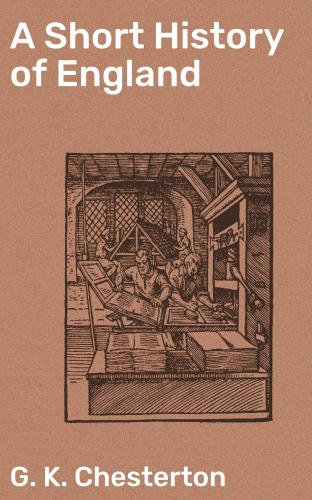G. K. Chesterton
A Short History of England
Published by Good Press, 2019
EAN 4057664140869
Table of Contents
ST. EDWARD AND THE NORMAN KINGS
THE PROBLEM OF THE PLANTAGENETS
NATIONALITY AND THE FRENCH WARS
SPAIN AND THE SCHISM OF NATIONS
THE WAR WITH THE GREAT REPUBLICS
ARISTOCRACY AND THE DISCONTENTS
INTRODUCTION
It will be very reasonably asked why I should consent, though upon a sort of challenge, to write even a popular essay in English history, who make no pretence to particular scholarship and am merely a member of the public. The answer is that I know just enough to know one thing: that a history from the standpoint of a member of the public has not been written. What we call the popular histories should rather be called the anti-popular histories. They are all, nearly without exception, written against the people; and in them the populace is either ignored or elaborately proved to have been wrong. It is true that Green called his book "A Short History of the English People"; but he seems to have thought it too short for the people to be properly mentioned. For instance, he calls one very large part of his story "Puritan England." But England never was Puritan. It would have been almost as unfair to call the rise of Henry of Navarre "Puritan France." And some of our extreme Whig historians would have been pretty nearly capable of calling the campaign of Wexford and Drogheda "Puritan Ireland."
But it is especially in the matter of the Middle Ages that the popular histories trample upon the popular traditions. In this respect there is an almost comic contrast between the general information provided about England in the last two or three centuries, in which its present industrial system was being built up, and the general information given about the preceding centuries, which we call broadly mediæval. Of the sort of waxwork history which is thought sufficient for the side-show of the age of abbots and crusaders, a small instance will be sufficient. A popular Encyclopædia appeared some years ago, professing among other things to teach English History to the masses; and in this I came upon a series of pictures of the English kings. No one could expect them to be all authentic; but the interest attached to those that were necessarily imaginary. There is much vivid material in contemporary literature for portraits of men like Henry II. or Edward I.; but this did not seem to have been found, or even sought. And wandering to the image that stood for Stephen of Blois, my eye was staggered by a gentleman with one of those helmets with steel brims curved like a crescent, which went with the age of ruffs and trunk-hose. I am tempted to suspect that the head was that of a halberdier at some such scene as the execution of Mary Queen of Scots. But he had a helmet; and helmets were mediæval; and any old helmet was good enough for Stephen.
Now suppose the readers of that work of reference had looked for the portrait of Charles I. and found the head of a policeman. Suppose it had been taken, modern helmet and all, out of some snapshot in the Daily Sketch of the arrest of Mrs. Pankhurst. I think we may go so
